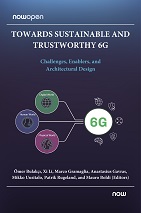Towards Sustainable and Trustworthy 6G: Challenges, Enablers, and Architectural Design

Edited by Ömer Bulakçı, Nokia, Germany | Xi Li, NEC Laboratories Europe, Germany | Marco Gramaglia, Universidad Carlos III de Madrid, Spain | Anastasius Gavras, Eurescom GmbH, Germany | Mikko Uusitalo, Nokia Bell Labs, Finland | Patrik Rugeland, Ericsson AB, Sweden | Mauro Boldi, TIM, Italy
Publication Date: 06 Jun 2023
Suggested Citation: Ömer Bulakçı (ed.), Xi Li (ed.), Marco Gramaglia (ed.), Anastasius Gavras (ed.), Mikko Uusitalo (ed.), Patrik Rugeland (ed.), Mauro Boldi (ed.) (2023), "Towards Sustainable and Trustworthy 6G: Challenges, Enablers, and Architectural Design", Boston-Delft: now publishers, http://dx.doi.org/10.1561/9781638282396
Downloaded: 120154 times
Description
While the 5th Generation (5G) system is being widely deployed across the globe, the information and communication technology (ICT) industry, research, standardization and consensus building for the 6th generation (6G) are already well underway with high expectations towards the merger of digital, physical, and human worlds. The main goal of this book is to introduce the upcoming 6G technologies and outline the foreseen challenges, enablers, and architectural design trends that will be instrumental in realizing a Sustainable and Trustworthy 6G system in the coming years.
The envisioned 6G system promises to offer a more advanced and comprehensive user experience not only by achieving higher speeds, larger capacity, and lower latency, but also much more improved reliability, greater energy efficiency, and an enhanced security and privacy-preserving framework while natively integrating intelligence end-to-end (E2E). Achieving these goals will require innovative technological solutions and a holistic system design that considers the needs of various stakeholders and future 6G use cases.
Capitalizing on the European 5G Public-Private-Partnership (5G PPP) Phase 3 projects working on 5G & Beyond and 6G research in recent years, and the join efforts between the Architecture Working Group (WG) and the 6G flagship Hexa-X project, this book delves into the critical challenges and enablers of the 6G system, including new network architectures and novel enhancements as well as the role of regulators, network operators, industry players, application developers, and end-users. Accordingly, this book provides a comprehensive landscape of the current research activities on 6G in Europe and sets a solid cornerstone on the 6G development towards a more connected, intelligent, and sustainable world.
Furthermore, as 5G PPP Phase 3 consists of the last calls of the Horizon 2020 program, this book is aimed to lay the architectural foundation for the next European program towards 6G, i.e., Smart Networks & Services (SNS) Joint Undertaking (JU).
About the Editors
Ömer Bulakçı is the 6G Program Manager at Nokia, Germany and the Chair of the 5G PPP Architecture Working Group.
Xi Li is a Senior Researcher at NEC Laboratories Europe in Germany and the Vice-Chair of the 5G PPP Architecture Working Group.
Marco Gramaglia is a visiting professor at University Carlos III of Madrid.
Anastasius Gavrasis a programme manager at Eurescom GmbH in Germany.
Mikko Uusitalo is Head of Research Department Radio Systems Research Finland at Nokia Bell Labs and overall lead in the European level 6G Flagship projects Hexa-X and Hexa-X-II.
Patrik Rugeland is a Master Researcher at Ericsson Research, Sweden and is the Technical Manager in the European 6G flagship projects Hexa-X and Hexa-X-II.
Mauro Boldi is a Project Manager in the Innovation department at TIM, Italy, and is currently leading dissemination activities in the European 6G flagship projects Hexa-X and Hexa-X-II.
-
ISBN: 978-1-63828-239-6
420 pp. Open Access (.pdf) This is published under the terms of CC BY-NC
